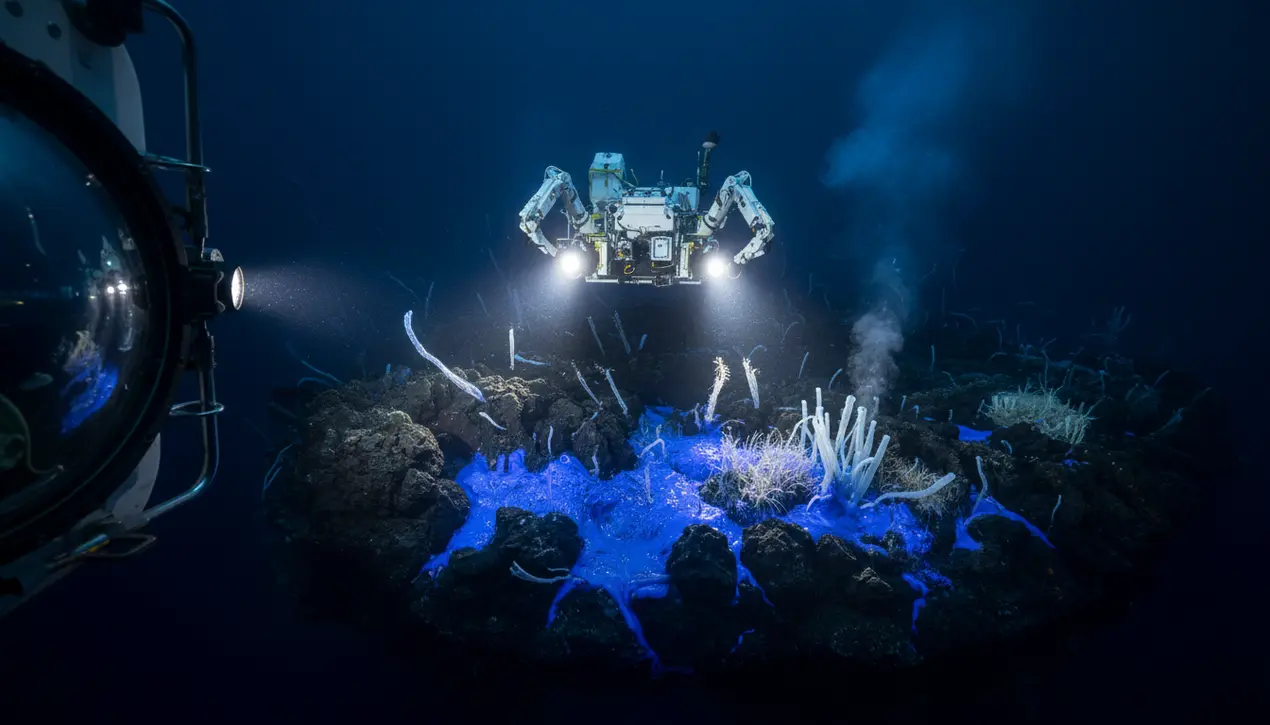
Scienceearth scienceVolcanology
Scientists Find Living Blue Volcanic Goo in Deep Ocean.
TH
Thomas Green
2 hours ago7 min read1 comments
In the crushing, lightless depths of the Pacific Ocean, near the formidable Mariana Trench, scientists have stumbled upon a phenomenon that seems ripped from the pages of a cosmic sci-fi novel: a living, electric-blue volcanic goo. This isn't merely a new species or a geological curiosity; it's a radical testament to life's tenacity in the most alien environments imaginable.The substance, a highly alkaline mud with a pH of 12—comparable to corrosive household bleach—spews from mud volcanoes nearly 3,000 meters below the surface, a realm where pressure is immense and sunlight is a forgotten concept. The very existence of biological activity in such a caustic, high-pressure environment forces a fundamental re-evaluation of the conditions necessary for life, not just on Earth but across the cosmos.If life can thrive here, in what is essentially a vat of toxic, underwater lye, then the potential for life on the icy, alkaline moons of the outer solar system, like Jupiter's Europa or Saturn's Enceladus, becomes exponentially more plausible. This discovery echoes the profound implications of finding extremophiles at deep-sea hydrothermal vents decades ago, which permanently expanded our understanding of life's playground.The 'blue goo' is more than just a bizarre mud; it's a biological rebellion, a community of archaea or bacteria that has not just adapted to but fundamentally capitalized on a chemistry that would instantly destroy most known organisms. These microbes likely harness the chemical energy from the volcanic seepage, performing chemosynthesis in a way that makes them the foundational producers of a completely isolated ecosystem, much like the tubeworms and clams found at hydrothermal vents.The vibrant, almost unnatural blue coloration itself is a subject of intense intrigue; it could be a byproduct of their unique metabolic processes or perhaps a mineral signature of the specific geochemistry at play. Researchers are now racing to sequence the DNA of these life forms, which will reveal their place on the tree of life and unlock the secrets of their biochemical machinery.The implications for biotechnology are staggering, potentially offering new enzymes for industrial processes or novel compounds for medicine, all derived from organisms that have evolved to operate in a world of extreme alkalinity. This discovery serves as a humbling reminder that we have better maps of the surface of Mars than we do of our own planet's seafloor. Each foray into the abyss, each deployment of a remotely operated vehicle like the one that likely found this goo, is a voyage into the true final frontier, revealing that the greatest mysteries and most alien landscapes are still right here, waiting in the profound darkness of Earth's oceans.
#featured
#deep sea
#Mariana Trench
#mud volcano
#extremophiles
#alkaline environment
#marine biology
#scientific discovery
Stay Informed. Act Smarter.
Get weekly highlights, major headlines, and expert insights — then put your knowledge to work in our live prediction markets.
Comments
Loading comments...
© 2025 Outpoll Service LTD. All rights reserved.